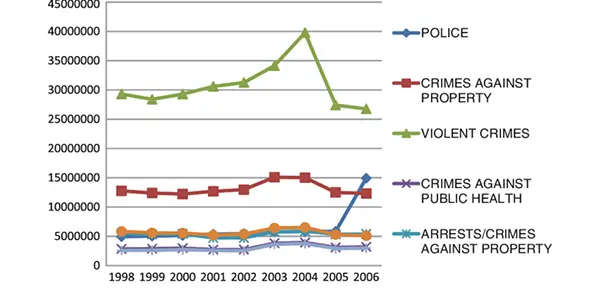- Beginnings of Criminal Law
- Formation of Common Law
- The Magna Carta and the Rule of Law
- Enlightenment Period and Reformative Principles
- The Emergence of Statutory Law
- Criminal Law in the Context of Human Rights
- The Contemporary Criminal Justice System
- Technological Progress and Cybercrime
- The Debate Surrounding Drug Laws and Sentencing Reform
- Navigating Criminal Law in the Age of Social Media
Key Takeaway
- Criminal Law is a common law system that laid the groundwork for criminal justice, influencing legal structures globally.
- The most prominent document in criminal law history is the Magna Carta, signed by King John of England in 1215.The criminal justice system will inevitably confront obstacles arising from novel technologies, shifting societal dynamics, and emerging types of criminal conduct
As a vital aspect of the legal framework, criminal law possesses a vast history that extends over centuries. It has significantly transformed to accommodate shifting societal values, technological advancements, and an expanding comprehension of justice and human rights. This article delves into the notable landmarks and imperative reforms that have molded the course of criminal law into its current form.

Beginnings of Criminal Law
The roots of criminal law can be linked to ancient civilizations where transgressions against people and society frequently resulted in retribution or revenge. Initial legal systems were centered on compensation and penalties like banishment, fines, or physical punishments.
In age-old societies such as Mesopotamia, the Code of Hammurabi (around 1754 BCE) is one of the most ancient instances of a legal code supervising criminal and civil issues.
Formation of Common Law
The British common law system had a considerable impact on molding present-day criminal law. Gradually, a collection of rulings and legal principles based on precedent emerged from judges’ decisions in various cases. This common law system laid the groundwork for criminal justice, influencing legal structures globally.
The Magna Carta and the Rule of Law
Among the most prominent documents in criminal law history is the Magna Carta, signed by King John of England in 1215. This noteworthy charter introduced the idea that nobody, including the ruler himself, was exempt from the law. It set the stage for the rule-of-law concept, underlining that individuals possess basic rights which cannot be capriciously violated by the government.
Enlightenment Period and Reformative Principles
Throughout the Enlightenment in the 17th and 18th centuries, there was a transition in criminal justice thinking from harsh punishment to more progressive principles. Intellectuals like Cesare Beccaria championed proportionate punishment, guaranteed penalties, and abolishment of torture.
This era paved the way for contemporary criminal law’s emphasis on rehabilitation, deterrence, and safeguarding individual liberties.
The Emergence of Statutory Law
With societies becoming more intricate, the need for systematized laws arose. In the 19th and 20th centuries, several nations began establishing comprehensive criminal codes covering
Interesting Fact: Austrian philosopher Hans Kelsen believed that law is separate from morality, it is endowed with “normativity” meaning we ought to obey it.
an array of offenses and their respective punishments. These statutory laws contributed to increased clarity and consistency within criminal justice systems.
Criminal Law in the Context of Human Rights
During the mid-20th century, criminal law started to focus extensively on human rights. International proclamations, such as the Universal Declaration of Human Rights in 1948, highlighted the necessity to protect fundamental rights for all individuals, including those accused of crimes. the Nuremberg Trials after World War II reinforced the idea of personal criminal responsibility for war atrocities, crimes against humanity, and acts of genocide.
The Contemporary Criminal Justice System
During the latter part of the 20th century and into the 21st century, criminal law evolved to adopt a more comprehensive and integrative approach within the criminal justice system. This evolution acknowledged the significance of restorative justice, victims’ rights, diversion programs, and alternatives to imprisonment. The aim was not only to penalize offenders but also to target the root causes of criminal behavior and foster rehabilitation.
Technological Progress and Cybercrime
The swift progress of technology introduced new challenges in criminal law. The emergence of the internet and digital communication contributed to a surge in cyber crimes such as hacking, identity theft, and online fraud.
Consequently, lawmakers had to modify existing laws and develop new ones to tackle these novel forms of criminal activities. Also, there are various speculated ways to improve the criminal justice system with digital technology.
The Debate Surrounding Drug Laws and Sentencing Reform
In recent decades, discussions surrounding drug laws and sentencing practices have persisted. Numerous jurisdictions have reassessed their “war on drugs” strategies and acknowledged the requirement for a more balanced and health-centric approach to drug offenses.
Sentencing reforms have aimed at decreasing overcriminalization when promoting alternatives to incarceration for non-violent offenses.
Navigating Criminal Law in the Age of Social Media
The rise and popularity of social media platforms have ushered in new challenges for criminal law. Matters such as cyberbullying, online harassment, and the propagation of false information have sparked discussions about achieving the perfect balance between freedom of speech and criminal liability.
Criminal law’s development exhibits the constant evolution of legal systems and societies. Evolving from ancient retribution codes to contemporary notions of fairness, human rights, and rehabilitation, criminal law has transformed significantly in order to cater to the diverse requirements and values of communities around the globe.
In the current criminal justice system, a criminal lawyer Mississauga holds a pivotal position by championing fair treatment for individuals and upholding human rights and rehabilitation principles that have developed across centuries of legal tradition.
As we continue to advance, the criminal justice system will inevitably confront obstacles arising from novel technologies, shifting societal dynamics, and emerging types of criminal conduct. To guarantee that criminal law remains just, equitable, and responsive to both individuals’ and communities’ evolving necessities, it is vital for policymakers, legal professionals, and society as a whole to participate in continuous dialogues and reforms.






